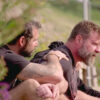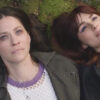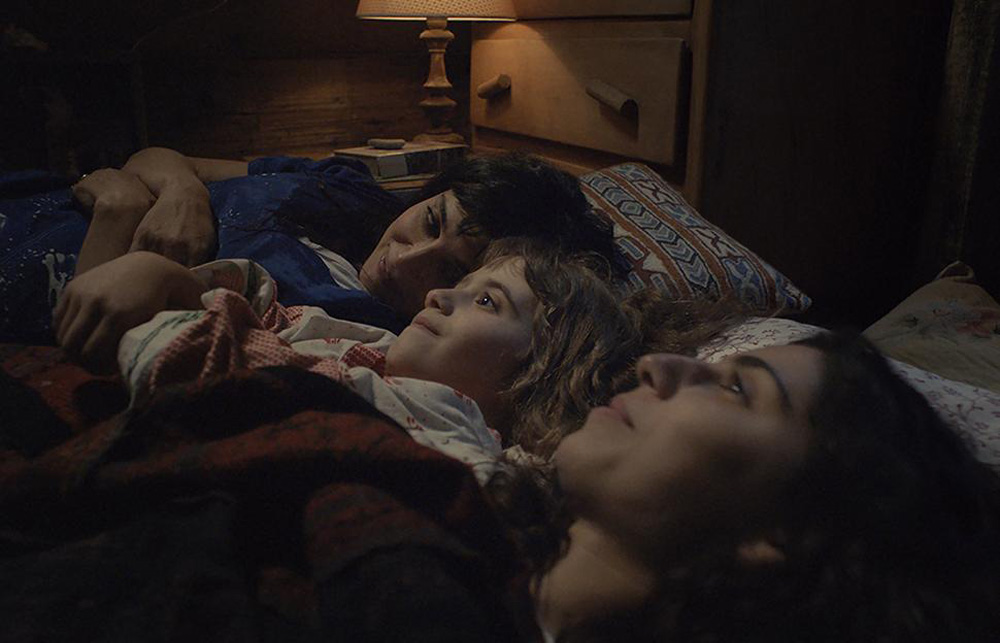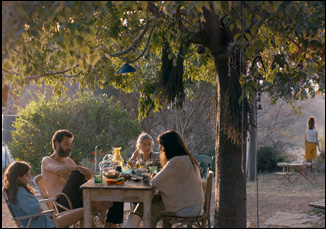“They don’t seem to be preparing the land,” Walid (Sales Bakri) says with great suspicion, looking over his fence on a hillside far outside of Beirut in “Costa Brava, Lebanon” as workers start construction on a landfill right below his family’s home. After a presidential decree that 80 percent of trash will soon be recycled rather than burned, just one major issue among many in the country where it feels the air has been poisoned not only by the inefficient process of waste disposal but the political climate amidst an economic crisis and ongoing civil unrest, a photo op comes and goes, but Walid and his wife Souraya (Nadine Labaki) are left to wonder if the paradise they created for themselves nearly a decade earlier to raise daughters Rim (Geana and Ceana Restom) and Tala (Nadia Chancel) with their grandmother Zeina (Liliana Chacar Khoury) will survive intact.
It’s a concern that Mounia Akl grew up with, justified as recently as days before shooting “Costa Brava, Lebanon” in August 2020 when an explosion occurred in the Port of Beirut, taking over 200 lives and injuring thousands more. The ravaged area can be seen in the opening frames of her debut feature as a presidential statute is transported to the landfill in the valley, but the director shows a wonderfully light touch inviting audiences to spend time with the Badris, working from a script she co-wrote with “10,000 Km” co-writer Clara Roquet with no shortage of schadenfreude as the project brings not only literal garbage into the community, but a number of other toxic elements such as the internet, which the kids have been blissfully free of, and bureaucrats sent there to manage the property, encroaching ever further onto the family’s private land.
However, the takeover of real estate is of secondary interest to both the filmmaker and her adult characters than what effect it’ll have on the children in such formative years, coming to wonder what their parents were like in their younger years when only now they find out that their mother was once a popular singer, a revelation that is benign on its own yet may lead to other questions regarding their time in Beirut that they had hoped they never would be asked. Amidst such a thorny situation, the obvious affection between the family members and the enchanting sensuality of the film’s sun-kissed setting are clearly infused with the love Akl has for the place, making the stakes so great to realize what is being lost.
“Costa Brava, Lebanon” is a warm and magnificently sophisticated drama and as it begins to make its way around the world, arriving in America after premiering last fall at the Venice and Toronto Film Festivals, Akl graciously spoke about how she found such an inventive way to bring a personal story to the screen, a few of the ways she conjured movie magic and the collaborations that helped make the film so special.
I think my desire to talk about family and how the structure of a family often mirrors the structure of a society came from my childhood. I grew up in a family of women with one man and a family of artists, of architects, of painters, of pianists, and my family were the people I love the most, but at the same time, there was the moment where I realized, “Well, they’re flawed” and that’s when the screenwriter in me was born. It’s like when you have a dream and you realize that every character in your dream is a version of yourself, I realized growing up that every member of my family is a mirror of myself somehow, or a side of me, and I thought that the avenue of the family would be the best way I could talk about my complex relationship to Lebanon, my country.
One of the most interesting elements of the film I feel is that this couple’s kids would have less of a reason to know who their parents once were because they live outside the city. Was that a foundational idea?
Yes, in many ways I think that our parents sometimes try to protect us from their past and from their realities. For example, I was born in ’89 during the end of the war, so I didn’t live the war, but I inherited the trauma of my parents, not because they spoke about it at home, but because they didn’t speak about it and it was a taboo subject. And I was interested in talking about [“in Costa Brava, Lebanon”], for example, how Souraya’s past is something she doesn’t talk about to her kids, because the same way, I sometimes don’t want to talk about Lebanon with my friends when I’m out of Lebanon because it’s an ache that’s so big and so painful that sometimes speaking about it is a reminder that our country is falling apart. But for the father talking about Beirut is talking about his biggest love because in the end, he is completely in love with the Beirut, and that’s why he’s so harsh. So I wanted to explore the silence of our parents when it comes to their trauma and how it makes kids even more curious.
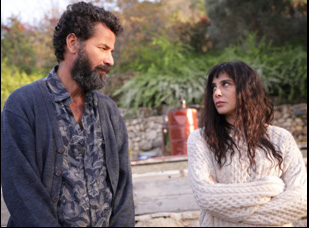
Yes, Clara is my best friend and we met at Columbia University. I was reading her script because we were sharing a class, and I realized when I read her script that she had this desire to talk about family dynamics that I had, and I really loved her writing, so she and I co-wrote my short film “Submarine,” and we remained colleagues and friends since then. Writing “Costa Brava, Lebanon” together was partly because we both are interested in similar subjects when it comes to coming-of-age family dynamics, but also because we wanted an excuse to spend more time together after we moved out of New York.
Did you actually know where in Lebanon you wanted to shoot this before writing?
The location for me was very important because through the location I was able to talk about the psychology of my characters through the objects in their space from the absurdity of their storage room, [where it’s] stocking things as if it’s a bunker, or to the excessive beauty of their garden, which is almost absurdly a contrast to the reality of the city. We shot in three different locations that we stitched together like a puzzle, which is easy for me because I’m interested in architecture and how you can talk about someone’s life by showing the spaces that they inhabit, and it was designed by the production design team, but also the VFX team — because we didn’t destroy this mountain, so the garbage landfill is a VFX element and we found the house in the mountains — two different houses that we stitched together. What was great about that is the owner of one of the houses is a man who lives exactly the way the family lives — a self-sustainable lifestyle, isolated from society, [with] homeschooled kids, so I was able to get inspired by the lifestyle of this man for the lifestyle of my characters.
It’s sneaky great to learn you stitched together a house when I understand Rim, the unforgettable lead character, is played by a pair of young twin girls. What was it like to find them?
Yes, actually Ceana [Restom] and Geana [Restom] are twins, but it was an accident that I found twins because I had been looking for the character that was going to play Rim for so many months, and I wasn’t finding her. Not only did I want the perfect kid, but I wanted the perfect kid with the blue eyes of her father so that she can be the perfect copy of Walid. And then one day the casting director shows me a video of a very fierce kid being snappy at the camera, and I say, “This is her. We found her.” And she says, “Well, there’s two of them, they’re twins.” So I asked her to bring both of them to the casting session, thinking I would have to choose one of those two girls and I fell in love with both because each of them had a side of Rim that the other one didn’t. One of them was this fierce physical tomboy that was pretty savage, like Mowgli in “The Jungle Book,” and the other one was really an old soul inside a child’s body that had the maturity of a 50-year-old. For example, the scene where [Rim is] hugging her father on the rooftop, telling him you should apologize to mom or the scene where she’s hiding in the tree, that’s the same girl, but the more physical scenes with the rat traps or the fighting, that’s the other one.
Did it help having Nadine Labaki, coming off of directing one of the great child performances in “Capernaum,” around?
The great advantage of working with Nadine is that first of all, she’s so professional the director in her was not on set with us. She was just an actress and she just let herself be in my vision and never tried to impose anything. She trusted me and she trusted how I was looking at her through the lens and let herself go as an actress, but the fact that she’s a director made it easier for me because sometimes I didn’t have to say much and she understood what I wanted. And sometimes when the kid would make mistakes within the scene, she would help her improvise as an actress helping another a non-actor because the kids have never acted before.
Were there any moments where something unexpected happened but you could embrace them?
I always welcome accidents because what you want to create in a film is moments of real life, and when this bridge between acting and reality is broken, these are the most magical moments on set. There’s a scene in the film where one character actually made a mistake — Rim says, “Chlorine” [referring to the pool], but she said “alcohol” instead and I kept it in the edit because it sounds like the character made that mistake, so I was always open to improvisation and to happy accidents and some of my favorite moments in the film came out of those, me letting loose, and, and, and not considering that the script is sacred.
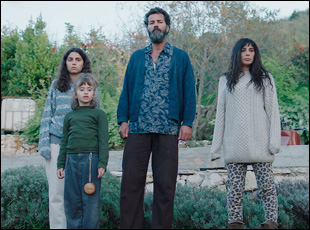
I wanted to translate that moment as a child when you’re eavesdropping on your parents conversation and realizing that your parents are and their relationship and their couple is not invincible. It’s the moment Rim realizes the marriage of her parents is a little bit fragile, and that she believes that it’s a responsibility of hers to keep her parents together. When I was the age of Rim, I remember thinking that my parents remaining together was my responsibility for some reason, and when they divorced, it felt like my own personal failure. Of course, I know now that it’s not the case, but I wanted to translate in that scene a kid hidden in a tree, realizing her parents’ marriage might not be as flawless as she thinks. And in terms of the pool, in many ways throughout the film, it represents the evolution of the family. It starts at this perfect place that’s filled with clean blue water, and then it evolves into this toxic water, and then in the end [the pool] is completely empty, so [I wanted] an architectural element through which to show the degradation of this family.
What’s it like having such a major achievement under your belt with your first feature and having it go out into the world?
It’s pretty crazy because after so much time being in a pandemic [and now] traveling so much, I feel like I’m in this weird dream, “Where am I? Is this happening? Am I really on an airplane and I’m at a film festival?”Of course, it’s the most beautiful feeling in the world presenting your film to audiences, but it’s also scary because it’s a very personal film and I’m showing it to a bunch of strangers — and I just finished the film three weeks ago — so sometimes I watch it in the audience and I’m re-editing it while watching. I haven’t abandoned the movie yet, so there’s the anxiety that comes with that, but at the same time, the joy.
“Costa Brava, Lebanon” opens on July 15 in New York at the Quad Cinema and July 22nd in Los Angeles at the Monica Film Center. A full list of theaters and dates is here.
